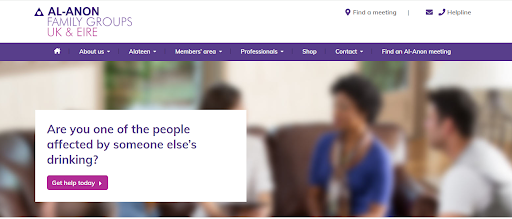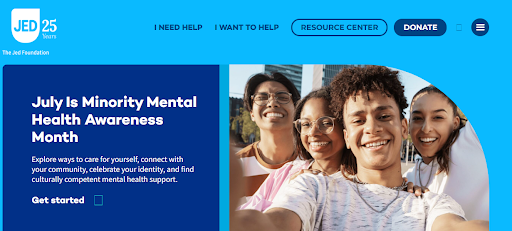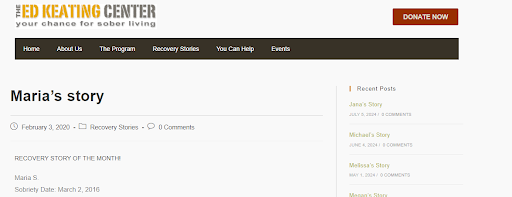When a loved one struggles with addiction, it’s easy to feel unsure of how to help. But remember, there’s a hope. Building a strong support network is crucial for both your loved one’s recovery and your own well-being.
This means taking care of yourself while also offering understanding and encouragement to your loved one.
In this blog, we’ll share practical tips and guidance to help you build a solid foundation for everyone involved.
First Off, Let’s Talk About Build Your Own Support System
Here’s how you can build your own support system.
Seek Professional Help & Guidance
As a loved one of someone in recovery, it’s important to remember that you don’t have to handle this journey alone. Vladimira Ivanova, Psychologist at The Diamond Rehab Thailand, says, “Seeking professional help and guidance can provide you with the knowledge, tools, and emotional support necessary to navigate the challenges of supporting your loved one and maintaining your own well-being.”
Therapists and counselors specializing in addiction can offer valuable insights into the complexities of recovery, help you understand your own emotions, and teach you effective communication and coping strategies.
Support groups specifically designed for the loved ones of individuals in recovery, such as Al-Anon or Nar-Anon, can be a lifeline. These groups provide a safe and understanding space to share your experiences, connect with others who truly understand what you’re going through, and learn from their wisdom and strength. They offer a community and shared purpose — reminding you that you’re not alone in this journey.
Remember, seeking professional help is not a sign of weakness but a courageous step towards self-care and building a stronger support system for both yourself and your loved one.
For example, Lisa, whose son was battling opioid addiction, found solace and guidance in Al-Anon meetings.

She learned about the disease of addiction, shared her struggles with other parents, and received support and encouragement during her son’s relapses. Through the group, Lisa discovered effective communication strategies and learned to set healthy boundaries — which strengthened her relationship with her son and supported his recovery.
Connect with Other Loved Ones of Individuals in Recovery
Sharing your experiences and emotions with others who understand your situation is incredibly therapeutic. Connecting with other loved ones of individuals in recovery provides a unique form of support that you won’t find elsewhere.
These individuals have walked a similar path and can offer empathy, understanding, and practical advice based on their own experiences.
Through support groups, online forums, or even informal gatherings, you can create a network of people who share your concerns, frustrations, and hopes. You can learn from their successes and mistakes, gain valuable insights, and find strength in knowing that you’re not alone. Matthew Schulman, M.D, Award Winning Plastic Surgeon at Dr. Schulman Plastic Surgery, explains, “Sharing your story and listening to others can help you feel less isolated, reduce stress, and gain a fresh perspective on your situation.”

Let’s take the example of The Jed Foundation. They offer a variety of online resources and programs for individuals struggling with mental health issues, including forums and support groups where people can connect with others who share similar experiences.
The Jed Foundation’s online forums provide a safe and anonymous space for individuals to share their struggles, seek support, and offer encouragement to others. These forums are moderated by trained professionals who ensure a supportive and respectful environment.
The Jed Foundation also offers online support groups led by licensed therapists. These groups provide a more structured setting for individuals to discuss their challenges, learn coping skills, and connect with others in a similar situation.
Set Healthy Boundaries and Practice Self-Care
Supporting a loved one in recovery is emotionally draining. It’s essential to establish healthy boundaries to protect your own well-being. This means recognizing your limits and not taking on more than you can handle. It’s okay to say “no” when you need to and prioritize your own needs.
William Green, Founder of Botonics, adds, “Self-care is not selfish — it’s essential for maintaining your own physical and emotional health. Make time for activities that bring you joy and relaxation, such as exercise, hobbies, spending time with friends, or simply taking a break to recharge.” Remember, you can’t pour from an empty cup. By taking care of yourself, you’ll be better equipped to support your loved one in their recovery journey.
This might involve setting limits on financial assistance, declining invitations to events where substances are present, or establishing clear expectations for communication and behavior.
It’s also important to communicate these boundaries clearly and consistently to your loved one and others involved in their recovery. Remember, setting boundaries is not about abandoning your loved one — it’s about creating a healthier dynamic that supports both their recovery and your own well-being.
Let’s take the example of Maria. She struggled with supporting her son’s recovery while neglecting her own well-being.

Through therapy, she learned to set boundaries, limit financial support, and prioritize self-care. This approach not only strengthened Maria’s recovery but also fostered a healthier relationship with her son — showing the importance of boundaries and self-care when supporting a loved one’s journey.
Prioritize Your Own Well-being
In the midst of supporting a loved one’s recovery, it’s easy to neglect your own needs. However, prioritizing your own well-being is not only essential for you but also crucial for the person you’re supporting. When you are physically and emotionally healthy, you have more energy, patience, and resilience to offer.
Pareen Sehat MC, RCC – Clinical Director at Well Beings Counselling, shares, “Make time for activities that bring you joy and fulfillment, whether it’s reading a book, taking a walk in nature, pursuing a hobby, or simply spending time with friends. It’s also important to maintain a healthy lifestyle by eating nutritious meals, getting enough sleep, and exercising regularly.”
Don’t hesitate to seek support from others, whether it’s through therapy, support groups, or talking to a trusted friend.
Build Resilience and Find Joy
While supporting a loved one in recovery can be challenging, it’s important to remember that there is still room for joy and personal growth in your own life. Focus on building resilience by practicing gratitude, building positive relationships, and seeking out activities that bring you happiness.
This might involve spending time in nature, volunteering for a cause you care about, learning a new skill, or simply enjoying quiet moments of reflection. Gerrid Smith, CMO of Joy Organics, shares, “By finding ways to nurture your own spirit and resilience, you’ll be better equipped to handle the ups and downs of supporting your loved one’s recovery.”
Remember, your loved one’s journey is not your own. You can be supportive and loving while still maintaining your own identity and pursuing your own dreams and passions. By finding a balance between supporting your loved one and prioritizing your own well-being, you create a healthier and more sustainable dynamic that benefits everyone involved.
Encourage Patience and Understanding
Recovery is a journey, not a destination. It’s a process filled with ups and downs, setbacks, and breakthroughs. As a loved one, it’s crucial to lift up patience and understanding. Remember that your loved one is working through complex challenges and may not always make the choices you hope for.
Richard McKay, CEO & Managing Director of Sprung Gym Flooring, says, “Be patient with their progress, celebrate their successes, and offer unconditional love and support even during difficult times. Avoid judgment and criticism, which can be detrimental to their recovery. Instead, focus on fostering a safe and supportive environment where they feel loved, accepted, and empowered to overcome their challenges.”
Support Your Loved One in Recovery
Supporting a loved one in recovery is a delicate balance of offering help and encouragement while respecting their autonomy and independence. It requires empathy, patience, and a willingness to learn and adapt. Here are some essential tips to guide you through this process.
Educate Yourself About Addiction and Recovery Resources
Knowledge is power. Understanding addiction as a chronic disease — its underlying causes, and the various recovery pathways available can help you better support your loved one. Read books, articles, and online resources about addiction and recovery, explains Warren Phillips, Co-Founder of Lantana Recovery.
Plus, attend educational workshops or webinars. Talk to therapists, counselors, or other professionals who specialize in addiction treatment. By arming yourself with knowledge, you can better understand your loved one’s struggles, challenges, and triumphs.
You can also learn about the different treatment options available, such as therapy, support groups, medication-assisted treatment (MAT), and sober living environments. This knowledge will help you make informed decisions and advocate for your loved one’s needs.
Effective Communication Strategies
Communication is key to any healthy relationship, but it’s especially important when supporting someone in recovery. Practice active listening, which involves paying full attention to what your loved one is saying, reflecting back on their words, and asking clarifying questions.
Validate their feelings, even if you don’t fully understand them. Let them know that you hear them, you care, and you’re there for them.
Martin Seeley, Senior Sleep Expert of Mattress Company, advised, “Avoid judgment, criticism, or blame. Remember, addiction is a disease — not a moral failing. Focus on offering support and encouragement, not lectures or ultimatums. Choose your words carefully and express your concerns with compassion and empathy.”
Encourage Healthy Habits
Recovery is not just about abstaining from substances; it’s about creating a healthier lifestyle. Encourage your loved one to prioritize their physical and mental well-being by adopting healthy habits.
This might involve eating nutritious meals, getting regular exercise, practicing relaxation techniques, and prioritizing sleep.
Offer to cook healthy meals together, go for walks or bike rides, or join a yoga or meditation class together. By engaging in healthy activities together, you can strengthen your bond and support their overall well-being.
Help to Identify Triggers and Manage Cravings
Relapse triggers are situations, people, places, or emotions that can increase the risk of returning to substance use. Help your loved one identify their triggers by talking openly about their experiences and observing their behavior.
Per Markus Åkerlund, CEO of MEONUTRITION, says, “Once triggers are identified, work together to develop strategies for managing them. This might involve avoiding certain situations, practicing coping skills, or seeking support from a therapist or support group.”
It’s also important to help your loved one manage cravings, which are intense urges to use substances. Encourage them to talk about their cravings, distract themselves with healthy activities, or reach out for support from a trusted friend or professional.
Navigate Setbacks and Relapse
Setbacks and relapse are common in recovery. It’s important to remember that relapse is not a failure but rather an opportunity for growth and learning. If your loved one relapses, avoid judgment or blame.
Instead, offer support and encouragement, and help them get back on track with their recovery plan. Remember, recovery is a marathon — not a sprint. It requires patience, perseverance, and a willingness to learn from mistakes.
Celebrate Milestones and Offering Positive Reinforcement
Recovery is a journey filled with milestones, both big and small. Celebrate these achievements with your loved one. Acknowledge their progress, offer praise and encouragement, and remind them of how far they’ve come.
Ksenia, Founder of Burburcare says, “Positive reinforcement can boost their self-esteem, motivate them to continue their efforts, and strengthen their commitment to recovery.”
Final Thoughts
Supporting a loved one in recovery is a journey that requires strength, patience, and understanding. By educating yourself about addiction, seeking professional guidance, and prioritizing your own well-being, you create a strong foundation for both yourself and your loved one. Remember, recovery is a process, and setbacks can occur.
But with the help of consistent support, open communication, and healthy habits, you can play a vital role in your loved one’s journey toward lasting recovery. Remember, you’re not alone in this. Also, there are numerous resources and support networks available to help you handle the complexities of addiction and recovery.
